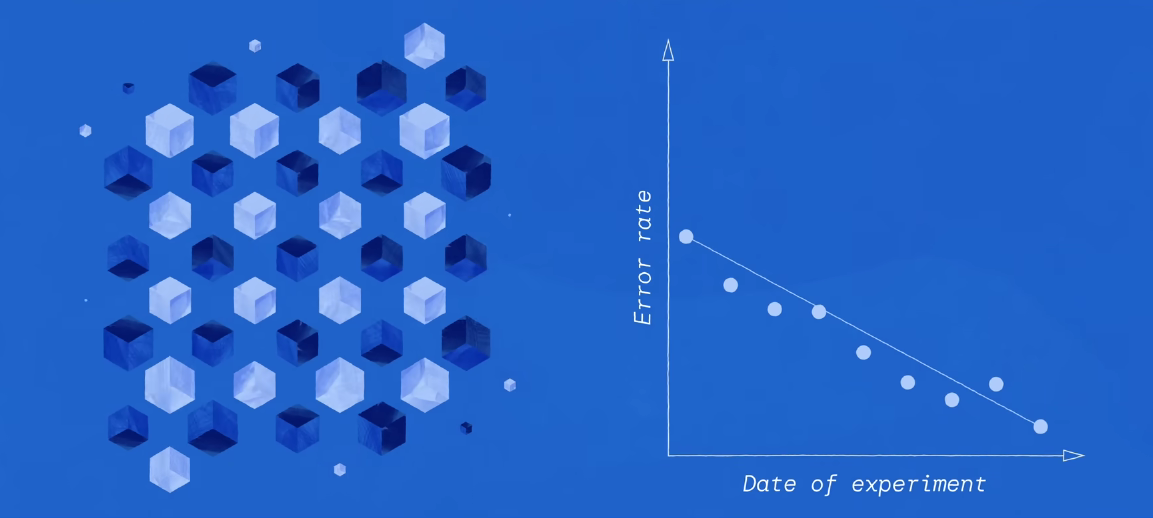Google over the previous couple of years has thrown coloration at lately’s quickest supercomputers with doubtful claims of attaining “quantum supremacy.” The tech massive could also be backing clear of that manner after its validity was once puzzled by means of researchers.
Remaining week, the corporate mentioned it had created a strong quantum pc with mechanisms to verify the device is strong. The corporate mentioned its latest quantum device had error-correction tactics that may generate dependable output with fewer mistakes.
Google mentioned the quantum device introduced a mixture of fewer mistakes and higher efficiency than its earlier methods. However the corporate additionally came upon that it needed to sacrifice a large number of quantum efficiency with a purpose to deliver steadiness to the device.

Not like its previous papers on quantum breakthroughs, Google didn’t declare quantum supremacy (or the extra restrained “quantum benefit”), an idea through which quantum computer systems can considerably outperform classical methods, that are not able to resolve identical issues in affordable time.
As a substitute, Google’s newest analysis is alongside the strains of constructing fault-tolerant methods that may face up to the worst of bumps thrown at it.
“For the primary time ever, our quantum AI researchers have experimentally demonstrated that it’s imaginable to scale back mistakes by means of expanding the selection of qubits,” mentioned CEO Sundar Pichai, in a weblog access remaining week.
Quantum computer systems are notoriously unreliable as qubits can simply spin out of regulate, which will spoil calculations. Google is claiming the error-free device opens the door to construct better quantum methods with strong qubits that have interaction in a coherent type.
The reliability on Google’s quantum pc hangs on higher error correction options. The 49-qubit device suppresses extra quantum mistakes by means of scaling up the dimensions of codes used to deal with predictable conduct. The {hardware} additionally has stabilizers to deal with device coherence and qubit steadiness.
Google’s leap forward is comparable to high-reliability options like RAS – or reliability, availability, and serviceability – which made mainframe computer systems fault tolerant. The ones complex error-correction options, which have been in chips like Intel’s Itanium, are actually same old in x86 server chips.
Quantum firms up to now have measured quantum growth by means of the selection of qubits. However Google’s 49-qubit device outlines a shift in how the corporate is coming near its quantum analysis, with a focal point on device steadiness.
Present quantum computer systems are noticed as being purposeful however no longer as dependable as classical supercomputers to hold out large computations. Primary cloud suppliers and supercomputing hosts like Jülich Supercomputing Centre, are nonetheless exploring packages which can be very best suited to quantum computer systems.
Google in 2019 claimed quantum supremacy, which is an idea in accordance with a 2012 paper by means of John Preskill of quantum computer systems outperforming classical computer systems, that are not able to do identical calculations in an affordable period of time.

Google’s debatable quantum supremacy paper in 2019 was once in accordance with a 54-qubit device referred to as Sycamore, through which the qubits are organized in a 2D array. Google mentioned that its 54-qubit was once ready to resolve particular issues in 200 seconds, which was once considerably sooner than the ten,000 years it could take classical supercomputers at the identical duties.
That declare was once straight away challenged by means of IBM, which mentioned that whilst Google’s fulfillment was once spectacular, it was once “being extensively misinterpreted and inflicting ever rising quantities of misunderstanding.” IBM’s Summit was once regarded as the arena’s quickest supercomputer on the time.
IBM later in 2019 went directly to post a paper that was once aimed toward disproving Google’s concept. The IBM paper identified that its Summit pc – with further secondary garage – was once ready to reach six occasions higher efficiency than the only claimed in Google’s quantum supremacy paper, and clear up issues in an affordable period of time.
Google’s declare of quantum supremacy was once once more challenged in 2022 by means of quite a lot of researchers, together with a bunch from Hebrew College of Jerusalem, which attempted to analyze the tech massive’s quantum supremacy claims.
The researchers famous that Google’s closed-door experiments had been unsuitable for causes that integrated evaluating its optimized quantum algorithms towards older classical algorithms, which have been slower. The researchers referred to as for a brand new Google quantum-to-classical computing comparability to more recent classical algorithms that might clear up in a question of seconds.
In 2018, Google additionally mentioned that “the experimental demonstration of a quantum processor outperforming a supercomputer could be a watershed second for our box, and stays certainly one of our key targets.” Google specified by 2018 a plan to exhibit a device “with 49 qubits, a circuit intensity exceeding 40, and a two-qubit error underneath 0.5%.”
Google has discovered that plan with its newest analysis leap forward, however the corporate is staying some distance clear of boasting about quantum supremacy. A paper at the analysis, which was once revealed in Nature remaining week, makes no claims of the quantum pc outperforming the quickest supercomputers.
As a substitute, Google’s newest quantum leap forward comes to scaling up its device to 49-qubits whilst correcting extra mistakes. The device has extra floor code — which is code to stumble on and proper quantum mistakes – connected to the quantum bits.
The method brings reliability and forestalls qubits from spinning out of regulate because it is going into superposition. It additionally prevents the advent of an risky surroundings through which calculations ruin down as device efficiency scales up.
“The newest quantum chip is probably the most tough we’ve ever made. However it nonetheless must be 1000’s of occasions better with a purpose to clear up all of the sensible packages that individuals are desirous about. The issue is, as you’re making it larger, you get extra mistakes,” mentioned Julian Kelly, director of quantum {hardware} at Google, in a video revealed on Youtube.
Early makes an attempt to run the set of rules at the quantum error-corrected device yielded horrible efficiency, however changes over months yielded higher efficiency and lowered error charges.
However there was once no longer a lot with regards to efficiency positive factors; the 49-qubit device setup simplest “narrowly” outperformed its reasonable 17-qubit setup, the analysis paper mentioned.

However efficiency apart, even the slightest relief of mistakes in a bigger qubit rely opens the door to create better quantum methods, the Google researchers mentioned.
Google’s objective is to place out an “error loose” quantum pc by means of 2029. The newest leap forward represents a shift of Google’s quantum targets to concentrate on device steadiness, and clear of claims of quantum supremacy.
Instructional researchers have mentioned there are lots of approaches to creating quantum computer systems, however the selection of qubits is not going to subject if the device isn’t dependable.
“The query of the feasibility of tough quantum computer systems beating classical super-HPC hinges on that it’ll be in the end imaginable to accomplish quantum error correction,” mentioned Göran Wendin, professor of quantum era on the Chalmers College of Era, in a analysis paper revealed on February 9.
IBM says the quantum benefit inflection level is nigh. The corporate’s roadmap features a device referred to as Flamingo in 2024 with greater than 1,386 qubits, and a device referred to as Kookaburra with greater than 4,158 qubits.
In the meantime, a staff from China mentioned it has already grabbed that ring, remaining yr claiming quantum benefit for a 60-qubit device, which took 4.2 hours to resolve an issue {that a} supercomputer would no longer be capable of do in an affordable period of time. The paper famous the measurements integrated “often stepped forward classical algorithms and hardwares,” and the “sampling process is set 6 orders of magnitude tougher than that” of the 54-qubit device that Google utilized in its debatable 2019 paper.

Wendin mentioned that “to create helpful packages appearing quantum benefit, it’s important to scale up QPUs and similar classical-quantum hybrid (HPC+QC) infrastructure.”
Public and hybrid cloud suppliers see an infrastructure rising with quantum computer systems to be had as accelerators in typical data-center environments. Dell provides get admission to to an IonQ quantum pc in its computing infrastructure. All main cloud suppliers additionally be offering get admission to to experimental quantum methods.
Quantum computing researchers also are running on the idea that of quantum-circuit chopping, through which probably the most tough computing paintings is going to a quantum pc, and lower-priority paintings being offloaded to GPUs. Nvidia has a toolkit referred to as QODA that may simulate quantum workloads on GPUs.
Whilst cash-rich Google and IBM can have the funds for to spend extra time on analysis, the tale is other for quantum {hardware} startups which can be suffering financially. Startup Rigetti not too long ago reset its quantum {hardware} roadmap to prioritize error-mitigating quantum methods.
Supply By means of https://www.hpcwire.com/2023/02/27/google-sheds-quantum-supremacy-notoriety-to-focus-on-stability/




